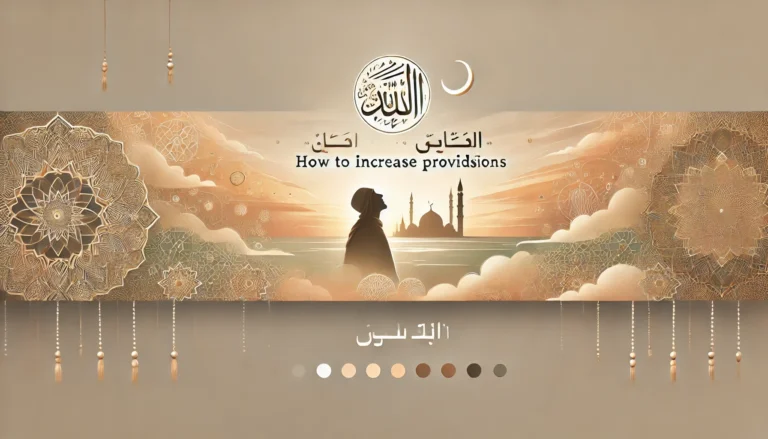Introduction: The Quest for Rizq in Islam
Rizq (sustenance) in Islam is more than just material wealth—it’s the provision Allah grants to His servants in different forms, including health, relationships, and knowledge. Many of us wonder how we can increase our rizq, especially during times of financial difficulty.
The beauty of Islam lies in the fact that Allah has provided us with guidance on how to attract and sustain rizq through various deeds and practices. Through trust in Allah (tawakkul) and performing good actions (a’mal), we can unlock the doors to blessings.
In this article, we’ll explore 16 practical ways to increase rizq, backed by Quranic verses and hadith, with actionable steps to incorporate these a’mal into your daily routine.
Table of Contents
1. Taqwa (consciousness of Allah)
Explanation: Taqwa is a central concept in Islam, meaning to live with awareness of Allah’s presence. It is mentioned repeatedly in the Qur’an as a means to attain not only Allah’s pleasure but also His provisions. Allah promises those who possess taqwa an abundance of rizq.
“وَمَن يَتَّقِ ٱللَّهَ يَجْعَل لَّهُۥ مَخْرَجًۭا * وَيَرْزُقْهُۥ مِنْ حَيْثُ لَا يَحْتَسِبُ”
“And whoever fears Allah – He will make for him a way out and will provide for him from where he does not expect.” (Surah At-Talaq, 65:2-3)
Actionable Steps:
- Reflect on your actions and align them with what pleases Allah. Avoid what He has prohibited, even in private.
- Develop a daily routine of dhikr (remembrance) and dua to nurture awareness of Allah.
- Make a sincere intention before every action to seek Allah’s pleasure, be it work, family duties, or worship.
2. Establishing Regular Salah (Prayer)
Explanation: Salah is the foundation of a Muslim’s life. Establishing regular prayers, particularly with khushoo’ (concentration), opens the doors of sustenance. Salah not only brings spiritual peace but also invites Allah’s help in our daily affairs, including rizq.
“وَأْمُرْ أَهْلَكَ بِالصَّلَاةِ وَاصْطَبِرْ عَلَيْهَا ۖ لَا نَسْأَلُكَ رِزْقًا ۖ نَحْنُ نَرْزُقُكَ”
“And enjoin prayer upon your family and be steadfast in it. We do not ask you for provision; We provide for you.” (Surah Taha, 20:132)
Actionable Steps:
- Ensure you pray all five daily prayers on time, making it a non-negotiable part of your day.
- Include Salat-ul-Duha (forenoon prayer), a practice known for inviting abundant rizq.
- Focus on improving concentration during prayer by setting aside distractions and preparing mentally before starting.
3. Tawakkul (Trust in Allah)
Explanation: Tawakkul means placing your complete trust in Allah while doing your best in worldly matters. The Prophet Muhammad ﷺ emphasized that true reliance on Allah is a powerful means to receiving sustenance.
“لَوْ أَنَّكُمْ تَوَكَّلُونَ عَلَى اللَّهِ حَقَّ تَوَكُّلِهِ لَرَزَقَكُمْ كَمَا يَرْزُقُ الطَّيْرَ”
“If you rely upon Allah with the reliance He is due, He would provide for you as He provides for the birds. They go out hungry in the morning and return full in the evening.” (Tirmidhi)
Actionable Steps:
- When facing difficulties, remind yourself that Allah is Al-Razzaq (The Provider), and He knows your needs.
- Couple your reliance with effort—work hard in your career or business, while trusting Allah’s plan.
- Make dua regularly, asking Allah to strengthen your trust in Him and increase your provisions.
4. Marriage as a Means of Increasing Rizq
Explanation: Marriage in Islam is not only a sacred bond but also a source of barakah (blessing). The Prophet Muhammad ﷺ assured that Allah provides sustenance for those who marry with a pure intention.
“وَأَنكِحُواْ ٱلۡأَيَٰمَىٰ مِنكُمۡ وَٱلصَّٰلِحِينَ مِنۡ عِبَادِكُمۡ”
“And marry those among you who are single and the righteous among your male slaves and female slaves. If they should be poor, Allah will enrich them from His bounty.” (Surah An-Nur, 24:32)
Actionable Steps:
- If you are single, make dua for a righteous spouse and trust Allah’s timing.
- For married couples, encourage mutual understanding and support to invite Allah’s barakah into the relationship.
- Prioritize fulfilling the rights of your spouse, as this strengthens your bond and invites Allah’s blessings.
You can read this to prepare for marriage in four steps: 4 Steps for Marriage Preparation According to Islam (balancemindset.com)
5. Seeking Forgiveness (Istighfar)
Explanation: Regularly seeking forgiveness (istighfar) is a well-known means of attracting rizq. Allah emphasizes the importance of istighfar in the Qur’an, linking it directly to blessings in both wealth and children.
“فَقُلْتُ اسْتَغْفِرُوا رَبَّكُمْ إِنَّهُ كَانَ غَفَّارًا * يُرْسِلِ السَّمَاءَ عَلَيْكُم مِّدْرَارًا”
“Ask forgiveness from your Lord, verily He is Oft-Forgiving. He will send [rain from] the sky upon you in [continuing] showers and give you increase in wealth and children.” (Surah Nuh, 71:10-12)
Actionable Steps:
- Make a habit of saying Astaghfirullah (I seek forgiveness from Allah) at least 100 times a day.
- Include istighfar in your morning and evening adhkar (remembrances).
- After every salah, reflect on your day and seek forgiveness for any shortcomings.
6. Maintaining Ties of Kinship (Silat Ar-Rahim)
Explanation: Maintaining good relations with family, particularly with extended relatives, is a direct way to increase rizq. The Prophet ﷺ stated that this deed leads to an increase in one’s lifespan and wealth.
“مَنْ أَحَبَّ أَنْ يُبْسَطَ لَهُ فِي رِزْقِهِ وَيُنْسَأَ لَهُ فِي أَثَرِهِ فَلْيَصِلْ رَحِمَهُ”
“Whoever would like his rizq to be increased and his life to be extended, let him maintain the ties of kinship.” (Sahih Bukhari)
Actionable Steps:
- Regularly call, visit, or message family members, especially those you may not speak to often.
- Resolve disputes with family and seek to maintain peace in family relations.
- Assist relatives in need, whether emotionally, financially, or by offering your time.
7. Giving Charity (Sadaqah)
Explanation: Charity never decreases wealth; instead, it invites barakah into your rizq. The more you give, the more you receive from Allah. This is a consistent promise in both the Qur’an and hadith.
“مَّثَلُ الَّذِينَ يُنفِقُونَ أَمْوَالَهُمْ فِي سَبِيلِ اللَّهِ”
“The example of those who spend their wealth in the way of Allah is like a seed of grain that sprouts seven ears, in every ear a hundred grains.” (Surah Al-Baqarah, 2:261)
Actionable Steps:
- Set aside a specific amount of your income regularly for sadaqah, even if it’s small.
- Donate to trusted charitable organizations or causes that benefit the needy.
- Look for opportunities to give, whether financially or through volunteering your time and skills.
8. Performing Salat-ul-Duha (Forenoon Prayer)
Explanation: The Prophet ﷺ taught us that praying Salat-ul-Duha is a powerful means of increasing rizq. This prayer, offered in the morning, brings immense barakah to one’s daily activities.
Actionable Steps:
- Schedule your day to perform Salat-ul-Duha between sunrise and before noon, even if it’s just two rak’ahs.
- Start small, and gradually increase the number of rak’ahs as you become more consistent.
- Pair this prayer with a heartfelt dua asking Allah to bless your day with productive and halal rizq.
9. Reciting Surah Al-Waqi’ah
Explanation: The recitation of Surah Al-Waqi’ah is widely regarded as a source of protection from poverty and a means to bring rizq. Many scholars recommend reciting this surah daily.
Actionable Steps:
- Make it a habit to recite Surah Al-Waqi’ah after Maghrib or Isha.
- If memorization is difficult, start by reciting from the mushaf and listen to it while reflecting on its meanings.
- Incorporate this recitation into your daily routine and be consistent, trusting in Allah’s promises.
10. Gratefulness (Shukr) for Allah’s Blessings
Explanation: Expressing gratitude to Allah for His blessings not only invites more rizq but also protects your existing provisions from being taken away. Allah promises to increase the blessings of those who are thankful.
“لَئِن شَكَرْتُمْ لَأَزِيدَنَّكُمْ”
“If you are grateful, I will surely increase you [in favor].” (Surah Ibrahim, 14:7)
Actionable Steps:
- Start a daily gratitude journal where you write down three things you are thankful for.
- Verbally express gratitude to Allah throughout your day, saying “Alhamdulillah” for every blessing, big or small.
- Share your blessings with others through charity or acts of kindness to spread barakah.
11. Seeking Halal Sources of Income
Explanation: Engaging in halal work and avoiding haram means of earning is critical for maintaining barakah in your wealth. Allah blesses income that is earned through lawful means.
Actionable Steps:
- Reflect on your job, business, or investments to ensure they align with Islamic principles.
- Avoid interest-based transactions (riba), gambling, or unethical practices in your business dealings.
- Ask Allah to guide you in finding or maintaining halal sources of income.
12. Helping the Orphans and Needy
Explanation: Helping those less fortunate is a powerful way to earn Allah’s favor and increase rizq. The Prophet ﷺ emphasized the importance of caring for orphans, promising great rewards for those who do so.
“أَنَا وَكَافِلُ الْيَتِيمِ فِي الْجَنَّةِ هَكَذَا”
“I and the one who takes care of an orphan will be in Paradise like this [raising his index and middle fingers].” (Sahih Bukhari)
Actionable Steps:
- Sponsor an orphan through trusted charities or donate regularly to causes that support children in need.
- Volunteer your time in local organizations that help the poor, homeless, or orphans.
- Make it a regular practice to give, even in small amounts, to those in need around you.
13. Patience (Sabr) in Times of Hardship
Explanation: Patience is a virtue that brings immense reward and invites Allah’s help in times of difficulty. When facing financial hardships, maintaining patience is key to seeing an increase in rizq.
Actionable Steps:
- When facing difficulties, remind yourself of Allah’s wisdom and trust that He has a plan for you.
- Stay firm in your good deeds, such as praying and giving charity, even in times of financial stress.
- Practice patience in daily life by reflecting on the rewards promised to those who endure hardship with grace.
14. Consistent Dhikr and Dua
Explanation: Regular remembrance of Allah (dhikr) brings peace to the heart and opens the doors to sustenance. Consistently making dua for rizq shows humility and reliance on Allah.
“فَاذْكُرُونِي أَذْكُرْكُمْ وَاشْكُرُوا لِي وَلَا تَكْفُرُونِ”
“So remember Me; I will remember you. And be grateful to Me and do not deny Me.” (Surah Al-Baqarah, 2:152)
Actionable Steps:
- Incorporate morning and evening dhikr into your daily routine, including phrases like “Subhanallah,” “Alhamdulillah,” and “Allahu Akbar.”
- After every salah, make a sincere dua asking Allah to increase your rizq and bless your efforts.
- Use specific duas for rizq, such as:
اللهم اكفني بحلالك عن حرامك وأغنني بفضلك عمن سواك
“O Allah, suffice me with Your halal (lawful rizq) over the haram, and enrich me from Your bounty.”
15. Reciting Quran Regularly
Explanation: The Quran is a source of guidance and blessings. Reciting and reflecting upon its verses opens the door to Allah’s mercy and provisions.
Actionable Steps:
- Set a daily time to recite even a small portion of the Quran, and reflect on its meaning.
- Recite Surahs such as Al-Fatiha and Al-Baqarah, which bring immense protection and blessings.
- Pair your Quran recitation with dua, asking Allah for clarity in your life and provisions.
16. Practicing Contentment (Qana’ah)
Explanation: Being content with what Allah has provided is a key to finding peace and increasing rizq. The Prophet ﷺ reminded us that true wealth lies in contentment with Allah’s decree.
“لَيْسَ الْغِنَى عَنْ كَثْرَةِ الْعَرَضِ، وَلَكِنَّ الْغِنَى غِنَى النَّفْسِ”
“Richness is not having many possessions, but richness is being content with oneself.” (Sahih Muslim)
Actionable Steps:
- Avoid comparing yourself to others in terms of material wealth.
- Focus on the non-material forms of rizq that Allah has blessed you with, such as health, family, and knowledge.
- Regularly remind yourself that true success is in contentment and that Allah’s provisions come in various forms.
Conclusion: Trust in Allah and Take Action
Increasing rizq is a combination of having trust in Allah, performing righteous deeds, and making the best use of what He has already provided. By applying these 16 practical ways to increase rizq, you can open the doors to Allah’s endless sustenance. Whether through taqwa, prayer, or charity, remember that every action counts and Allah’s provision is never limited. May Allah bless us all with abundant, halal rizq and barakah. Ameen.
FAQs: Common Questions on Increasing Rizq in Islam
Here’s a list of frequently asked questions (FAQs) related to increasing rizq (sustenance) in Islam. These questions address practical concerns and provide Islamic insights based on the Qur’an and Sunnah.
1. What is the most effective dua for increasing rizq?
One of the most powerful duas for rizq is:
اللهم اكفني بحلالك عن حرامك وأغنني بفضلك عمن سواك
“O Allah, suffice me with Your halal (lawful) over the haram, and enrich me with Your bounty over others.” (Tirmidhi)
Recite this regularly after salah or during sujood (prostration), with sincerity and reliance on Allah.
2. How often should I recite Surah Al-Waqi’ah to increase rizq?
It is recommended to recite Surah Al-Waqi’ah every day, especially after Maghrib or Isha. Regular recitation protects from poverty and invites abundant sustenance, as noted in the practices of scholars.
3. Can giving charity (sadaqah) really increase wealth?
Yes, giving charity does not decrease wealth but rather increases it. The Prophet Muhammad ﷺ said:
“مَا نَقَصَتْ صَدَقَةٌ مِّنْ مَالٍ”
“Charity does not decrease wealth.” (Sahih Muslim)
Sadaqah brings barakah (blessings) to your wealth and purifies your income, leading to more rizq.
4. How can I maintain taqwa in daily life to increase my rizq?
Maintaining taqwa involves being mindful of Allah in all actions. You can cultivate it by:
- Performing your daily prayers on time.
- Refraining from sinful actions, even in private.
- Regularly making dhikr (remembrance of Allah) and reflecting on His attributes.
- Keeping your intentions pure and seeking halal income.
Taqwa ensures that Allah provides for you from sources you cannot imagine (Surah At-Talaq, 65:2-3).
5. Does praying Salat-ul-Duha (Forenoon Prayer) increase wealth?
Yes, praying Salat-ul-Duha is a sunnah that brings rizq. It is prayed after sunrise and before noon. Even performing just two rak’ahs consistently is highly recommended for inviting blessings into your daily sustenance.
6. Can marriage increase rizq?
Yes, Islam teaches that marriage brings barakah and sustenance. Allah promises to enrich those who marry:
“إِن يَكُونُوا۟ فُقَرَآءَ يُغْنِهِمُ ٱللَّهُ مِن فَضْلِهِۦ”
“If they are poor, Allah will enrich them from His bounty.” (Surah An-Nur, 24:32)
Getting married with pure intentions and following the guidelines of Islamic marriage invites Allah’s provisions.
7. Does maintaining family ties really increase rizq?
Absolutely! The Prophet ﷺ said that maintaining ties of kinship (silat ar-rahim) increases both wealth and lifespan:
“مَنْ أَحَبَّ أَنْ يُبْسَطَ لَهُ فِي رِزْقِهِ وَيُنْسَأَ لَهُ فِي أَثَرِهِ فَلْيَصِلْ رَحِمَهُ”
“Whoever would like his rizq to be increased and his life to be extended, let him maintain the ties of kinship.” (Sahih Bukhari)
8. Can patience (sabr) in difficult times increase rizq?
Yes, practicing patience during hardships invites Allah’s mercy and opens the doors to rizq. Allah says:
“إِنَّ مَعَ ٱلۡعُسۡرِ يُسۡرًا”
“Indeed, with hardship comes ease.” (Surah Ash-Sharh, 94:6)
Remaining steadfast in your worship and trust in Allah, especially during challenging times, leads to increased sustenance.
9. How does contentment (qana’ah) affect rizq?
Being content with what Allah has provided (qana’ah) is a key to barakah in rizq. The Prophet ﷺ said:
“لَيْسَ الْغِنَى عَنْ كَثْرَةِ الْعَرَضِ، وَلَكِنَّ الْغِنَى غِنَى النَّفْسِ”
“Richness is not having many possessions, but richness is being content with oneself.” (Sahih Muslim)
When you are grateful and content, Allah increases your blessings.
10. How can I avoid earning haram income?
To avoid earning haram income, ensure your job, business, and investments comply with Islamic principles. This means:
- Avoiding involvement in interest (riba), gambling, or unethical industries.
- Seeking halal (lawful) sources of income and verifying that your transactions align with Islamic guidelines.
Making halal income a priority ensures barakah in your rizq.


